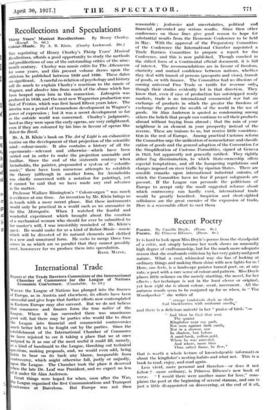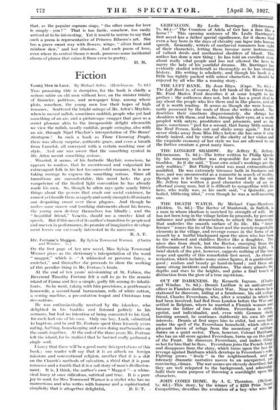Recent Poetry
Poems. By Camilla Doyle. (Beini. 6s.) Poems. By Princess Bibesco. (Bonn. HS.) IT is hard to look upon Miss Doyle's poems from the standpoint of a critic, not simply because her work shows an unusually high degree of craftsmanship, but for the much more adequate reason that she confounds criticism by her very gaiety and good nature. What a cool, whimsical way she has of looking at ordinary things and making them shine with new lights for us ! here, one feels, is a landscape painter turned poet, or, at any rate, a poet with a rare sense of colour and pattern. Miss Doyle places little reliance on the merely startling, the novel, for her effects ; her technique is not in the least clever or original, yet how right she is about colour, scent, movement. All the autumn woods seem to be conjured up for us when, in "The Woodpecker" she writes of
"orange toadstools sleek as sheik;
And blackberries with sunburnt smells," and there is a delicious naiveté in her "praise of birds "— "And blest be God that sent
The quaint Kingfisher near my path, Not seen against dark earth, Nor in a shower, nor In shadow, but before A sand-bank, yellow-gold, Where he was aureeled, And where, more blue Than salted flame, he flew,"
that is worth a whole lecture of knowledgeable information about the kingfisher's nesting-habits and what not. This is a book to read, enjoy, and read again.
Less vivid, more personal and therefore—or does it not follow ?—inore ordinary, is Princess Bibesco's new book of verse. "I would there were another name for love," com- plains the poet at the beginning of several stanzas, and one is just a little disappointed on discovering, at the end of it all. that, as the popular soprano sings, "the other name for love is simply—you ! " That is too facile, somehow, too easily arrived at to be interesting. Yet it would be untrue to say that .such a poem is representative of Princess Bibesco's art. She has a grave sweet way with flowers, wings, "silver frost and rainbow dew," and lost illusions. And each poem of love, even where its central theme is weak, possesses some incidental charm of phrase that raises it from verse to poetry.
H. M.











































 Previous page
Previous page